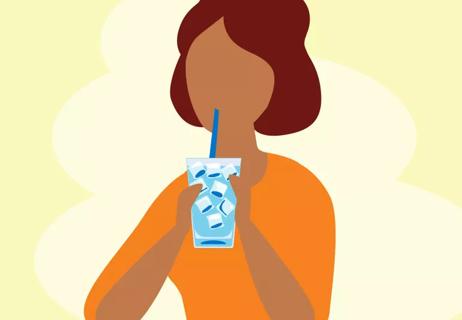Prescription oral antivirals are your best bet, but OTC creams can help, too

Cold sores always seem to choose the worst possible moments to appear — and once they arrive, they like to take their time clearing up.
Advertisement
Cleveland Clinic is a non-profit academic medical center. Advertising on our site helps support our mission. We do not endorse non-Cleveland Clinic products or services. Policy
“They tend to go away on their own in 10 to 14 days, but that doesn’t make them any less annoying,” says family medicine physician Sarah Pickering Beers, MD.
Here’s Dr. Pickering Beer’s advice for dealing with these stubborn sore spots.
The fastest way to send your cold sore packing is to see your primary care provider and get a prescription. If you’re not able to get in for a visit, over-the-counter and home remedies can also help.
Dr. Pickering Beers recommends the following to ease the discomfort and send that sore on its way.
“The quickest way to get rid of cold sores is to visit your provider and get a prescription for oral antiviral medications,” Dr. Pickering Beers says. These medications reduce pain and speed healing. They work best if you start taking them within the first day or so of the cold sore developing. If you wait longer, they won’t do much to help.
“If you’re one of the unlucky people who tends to get cold sore after cold sore, your doctor might be able to prescribe a daily antiviral to keep them at bay,” she adds.
If you can’t make it to your healthcare provider’s office, consider using docosanol (Abreva®) — it’s the only over-the-counter antiviral cream that’s U.S. Food and Drug Administration (FDA)-approved to knock back a cold sore.
Advertisement
“A cream is slightly less effective than oral antivirals, but they do reduce the pain and duration of the sore,” Dr. Pickering Beers notes. But like oral medications, you have to start using the cream ASAP for it to work.
Over-the-counter creams containing lidocaine and benzocaine can numb the burning and ease the discomfort of a cold sore — but they won’t make it heal any faster.
Pro tip: These creams are often marketed for dental pain, so Dr. Pickering Beers suggests looking for them in the dental section of your drug store.
Acetaminophen and ibuprofen may help reduce the redness, swelling and pain that comes with a cold sore. Bonus: You can use them in concert with most topical treatments.
DIY remedies aren’t likely to make a cold sore disappear any faster. But there are things that can help ease the pain, like:
Other potential alternative treatments you’ll see online — like propolis, lemon balm ointment, sage-rhubarb cream and olive leaf extract — may look promising, but require more research. The same is true of lysine and vitamin E oil. Recent studies on lysine supplementation suggest it’s unlikely to help prevent or treat cold sores. A small study conducted in 1980 suggests that putting vitamin E oil on a cold sore decreased pain and sped up wound healing, but those findings have never been confirmed.
Not every DIY treatment is a winner. Here are a few Dr. Pickering Beers suggests skipping:
Advertisement
Cold sores are no fun. And the last thing you want to do is inflict them on others. Especially kids. That’s because the virus can be life-threatening in a baby.
“As much as you might want to see your niece or nephew or grandbaby, please don’t shower them with kisses if you have an active cold sore,” Dr. Pickering Beers advises.
If you can’t avoid babies, keep them safe by:
See a healthcare provider if your cold sore doesn’t heal within two weeks, you’re unable to manage your pain, you’re immunocompromised or you develop other symptoms, like a fever.
Advertisement

Sign up for our Health Essentials emails for expert guidance on nutrition, fitness, sleep, skin care and more.
Learn more about our editorial process.
Advertisement

For fresher breath in the a.m., practice good oral hygiene, including flossing your teeth and scraping your tongue

These common mouth sores are very different — cold sores are caused by a virus and are contagious, but canker sores aren’t

This medicated liquid is available by prescription only and is specially formulated for your specific needs

Lots of things can activate the herpes simplex virus, from the common cold and cold weather to cracked skin and cosmetic procedures

This oral health practice doesn’t have proven benefits, and it’s not a substitute for brushing and flossing

Stay hydrated, use a humidifier and try sugar-free candies or over-the-counter products with xylitol

Non-cancerous ulcers usually heal within a few days or weeks — if it’s sticking around, it’s time to get it checked

Get quick relief with ice chips, popsicles, milk and saltwater

Even small moments of time outdoors can help reduce stress, boost mood and restore a sense of calm

A correct prescription helps your eyes see clearly — but as natural changes occur, you may need stronger or different eyeglasses

Both are medical emergencies, but they are very distinct events with different causes